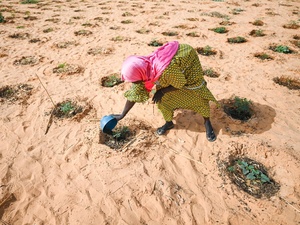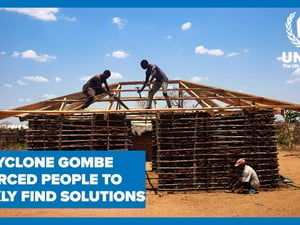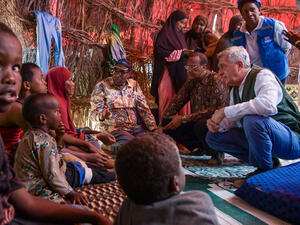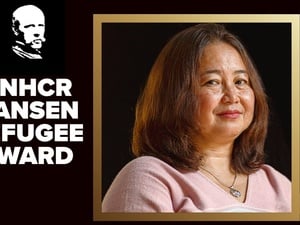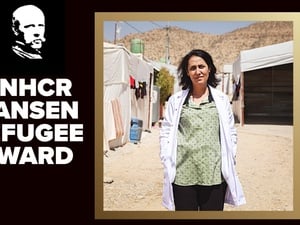Afro-Colombians and indigenous groups at risk from fresh fighting
Afro-Colombians and indigenous groups at risk from fresh fighting

A displaced Afro-Colombian woman ponders her future besides a cemetery in Colombia.
GENEVA, November 3 (UNHCR) - Dozens of Afro-Colombian and indigenous communities are at risk because of an upsurge in violence in north-western Colombia.
Ron Redmond, the refugee agency's chief spokesman, told journalists here Friday that while hundreds of people have fled to other parts of Colombia and some have crossed the border into Panama, thousands more were trapped and unable to leave.
Afro-Colombian communities around the Rio Arquía in the Chocó region are caught in the middle of fighting between the country's military and an irregular armed group that has been controlling the area for many years. Nine communities are at risk - a total of 450 families, or about 2,500 people.
"The two remotest settlements are now empty after the population fled the fighting last week and took shelter in a bigger community further upriver," Redmond said, adding that schools had been closed and there was not enough food for everyone.
"People fear more combat and want to leave the area altogether but are afraid they will not be allowed to return home if they go now. They are trapped in their settlements," the spokesman said.
To the south of Chocó, Afro-Colombian communities are fleeing fighting between two irregular armed groups. On Wednesday, some 400 people fled their homes in Pichima to escape the violence. The community has split, with families dispersing to several locations in the region. Local authorities are working to locate them and deliver emergency assistance.
Indigenous communities are also affected. Members of the Embera group are fleeing their river settlements because of a marked deterioration in the humanitarian situation. Their region is controlled by irregular armed groups and in recent months there has been a rise in selective killings, disappearances, threats and food blockades.
Twenty-five communities along the Bojayá River are at risk, caught up between armed groups vying for control of their territory. The Chocó region is a vast tropical jungle that stretches all the way to the Pacific and is rich in natural resources like timber and palm oil. The armed groups exercise tight control on the communities - often people have to ask for permission before they can step out of their settlements to go into the forest or on the river.
Some Embera families have fled to other parts of Chocó and elsewhere in Colombia, while a small number have reached Panama. Their only means of escape is by small boat and they have to travel long distances across dangerous territory. Many are too scared to approach the authorities. The whereabouts of a group of 35 Emberas who left their settlement at the end of last month remains unknown despite UNHCR's attempts to locate them.
"UNHCR calls on all actors in the armed conflict in Colombia to respect international humanitarian law, the right to freedom of movement and the right of civilians to seek safety both inside and outside their country," Redmond said.
He said the UN refugee agency urged local authorities to respond to the needs of those who have been displaced and called on Panama to fulfil its obligations towards refugees and asylum seekers.
Chocó is the poorest region in Colombia; with a population largely made up Afro-Colombians and indigenous people. Most people live in very remote settlements and their isolation makes them especially vulnerable to persecution.
Over the past few months, UNHCR has repeatedly expressed concern over the worsening situation in the region and its impact on both Afro-Colombian and indigenous communities. There are 3 million internally displaced people in Colombia, of which ethnic minorities make up a disproportionate number.


